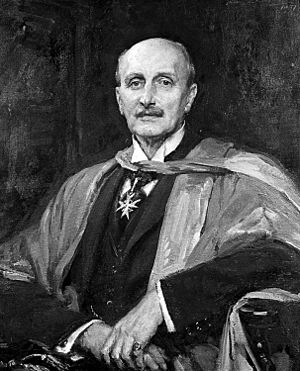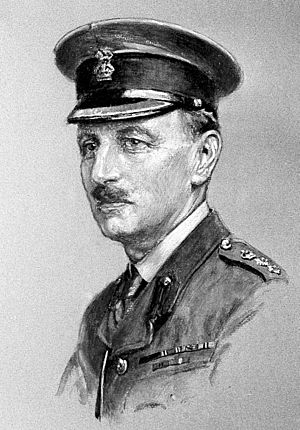Sydney Copeman facts for kids
Quick facts for kids
Sydney Arthur Monckton Copeman
|
|
|---|---|

Sydney Copeman
|
|
| Born | 21 February 1862 |
| Died | 11 April 1947 |
| Awards | Cameron Prize for Therapeutics of the University of Edinburgh (1898) |
Sydney Arthur Monckton Copeman (born February 21, 1862 – died April 11, 1947) was an important British doctor. He worked as a senior medical officer in the UK's Ministry of Health. He was well-known for his work on vaccination and public health.
Early Life and Education
Sydney Copeman was the oldest son of Rev Arthur Charles Copeman. His father was a vicar, which is a type of priest, in Norwich. Sydney went to Norwich School and then to Corpus Christi College, Cambridge University. He finished his studies there in 1882.
After Cambridge, he decided to become a doctor. He trained at St Thomas' Hospital in London. He became a qualified doctor in 1886. In 1890, he earned a special advanced degree, a Doctor of Medicine (MD), from Cambridge University.
Working for Public Health
In 1891, Sydney Copeman started working for the Local Government Board. This board helped manage local services and public health in the UK. He became a medical inspector, checking on health matters.
He was very interested in vaccination, which is a way to protect people from diseases. He helped develop something called glycerinated lymph. This was an improved way to make vaccines safer and more effective.
In 1898, he gave a special talk called the Milroy Lecture. It was about Vaccination – Its Natural History and Pathology. This talk was later published as a book. For his important work, he received the Cameron Prize of the University of Edinburgh in 1898.
In 1899, he became a Fellow of the Royal College of Physicians. This is a special honor for doctors who have made big contributions to medicine. In 1903, he was also chosen as a Fellow of the Royal Society. This is a very high honor for scientists in the UK.
Later Career and Legacy
In 1919, the Ministry of Health took over from the Local Government Board. Copeman continued his work there as a medical officer. He retired from this role in 1925. That same year, he received the Edward Jenner Medal from the Royal Society of Medicine. This medal is named after Edward Jenner, who developed the first vaccine.
After retiring from the Ministry of Health, Copeman continued to work in local government. He was a member of the Hampstead Borough Council. He led their public health committee, helping to improve health in the local area.
In 1934, he was elected to the London County Council. This council managed many services for London. He represented the area of Hampstead as a member of the Municipal Reform Party.
Sydney Copeman passed away in April 1947 in Hove, Sussex. He was 85 years old. His son, W. S. C. Copeman, also became a well-known doctor. He was a rheumatologist, a doctor who treats joint and muscle problems, and a medical historian.
 | Janet Taylor Pickett |
 | Synthia Saint James |
 | Howardena Pindell |
 | Faith Ringgold |


